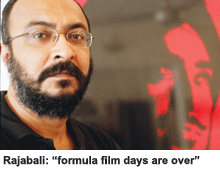Rather belatedly awareness has dawned upon the “braindead badshahs of Bollywood” that one of the major infirmities of Indian cinema is hackneyed plots, plagiarised storylines and poor scripting
India boasts the world’s largest commercial feature films and movie industry. In 2009 in its major production centres in Mumbai, Chennai, Hyderabad and several other regional hubs, the Indian movie industry produced 1,000 feature films, including 250 in Bollywood (Mumbai). The aggregate revenue of this thriving industry in the current year is projected at $3.3 billion (Rs.15,180 crore), rising at 18 percent per annum.
Curiously the Indian movie industry’s globally dominant position and annual growth rate has been sustained despite 85-90 percent of the country’s generally over-hyped and over-the-top melodra-matic feature films dominated by song and dance sequences, flopping at the box office. Industry monitors and analysts ascribe the persistence of this phenomenon to the huge size of India’s underground ‘black money’ economy, and to the ‘casino character’ of Indian cinema — while most producers keep losing money, some inexplicably hit the jackpot.
However, rather belatedly awareness has dawned on the “braindead badshahs of Bollywood” that one of the major infirmities of Indian cinema is its hackneyed plots, absurd and/or plagiarised storylines and poor scripting. Therefore in recent times scriptwriters, who were hitherto way down the pecking order in Bollywood as in Indian cinema generally, have risen in the estimation of producers, directors and star actors who call the shots in the world’s largest dreams factory. As a result, scriptwriting is emerging as an attractive career choice for those with a flair for penning dramatic narratives suitable for the cinematic medium.
Since many people are involved in the making of a film, a script must ensure that all participating parties understand the plot and its twists, turns and nuances. Therefore approved scripts need to adhere to popular formats, margins, notations and other conven-tions. However experience is the best qualification in this vocation; and thus the ability to hang in there until the big break comes is an important prereq-uisite. It’s pertinent to bear in mind that a budding film or television scriptwriter also needs to learn how camera angles and shots are linked to audio-visual narratives.
Although formal training in scriptwriting is not essential, a formal classroom or online course which puts the rules of scriptwriting in perspective will smooth your career path. The two institutions offering full-fledged script-writing courses are the Film & Television Institute of India (FTII), Pune, which conducts a one-year post-graduate study programme in screen-writing (admission on the basis of an entrance exam and interview), and Whistling Woods International, Mumbai, which offers a 24-month diploma and 12-month certificate course — classroom or online — in screen-writing to graduates. Several film institutes including the Satyajit Ray Film & Television Institute, Kolkata, include a screenwriting module in the film direction study programme.
 In the flourishing Indian cinema and television industries there’s plenty of scope for talented scriptwriters. Employ-ment opportunities galore are available with film studios, production compa-nies, advertising agencies and film units of government departments.
In the flourishing Indian cinema and television industries there’s plenty of scope for talented scriptwriters. Employ-ment opportunities galore are available with film studios, production compa-nies, advertising agencies and film units of government departments.
“The film industry is increasingly giving heavier weightage to scripts and screenwriters. And hitherto neglected writers are being accorded greater importance and paid higher fees. Not as much as they are worth, but much better than five years ago. The minimum fee recommended by the Film Writers Association is Rs.6 lakh for a full script (story-screenplay-dialogue), but provenly successful screenwriters today are demanding — and getting — Rs.50-75 lakh per script,” confirms Anjum Rajabali, head of the screenwriting departments of FTII, Pune, and Whist-ling Woods International, Mumbai, who has the scripts of Drohkaal, Ghulam, The Legend of Bhagat Singh among others, to his credit.
An economics and clinical psychology postgrad of Pune University, Rajabali started off as an amateur. “My close friend Baba Azmi encouraged me to try my hand at scriptwriting. It became a serious hobby for the first few years before I decided to make it my profession. Since I am disciplined, have studied the craft and meet my deadlines, I got noticed,’’ says Rajabali.
Nevertheless, in 1998, Rajabali enroled for the online screen-writing programme of the Univ-ersity of California at Los Angeles. “They had good teachers and the course was a great help in confirming what I had already learnt from experience,” he recalls.
The founder of the screenplay writing department of FTII, Pune and head of the screenwriting department of Whistling Woods, Mumbai, Rajabali believes that better and more original storylines and screenplays will revive Indian cinema. “The Hindi film formula days are over and there is so much more space for fresh thinking and originality. Young scriptwriters are responding to these opportunities with great enthusiasm. I feel gratified that screenwriting is finally being acknowledged as a satisfying vocation in its own right, rather than as a stepping stone for film direction,” he says.
Which is good news for the millions of disillusioned cineasts obliged to suffer candyfloss Indian cinema.
Indra Gidwani (Mumbai)